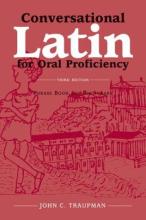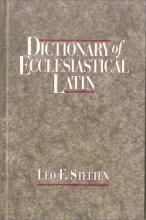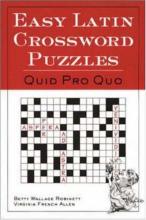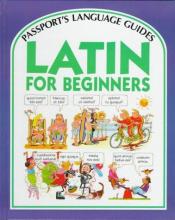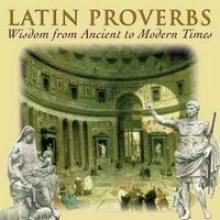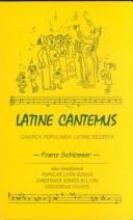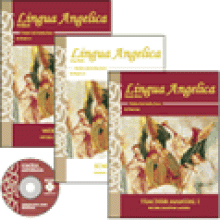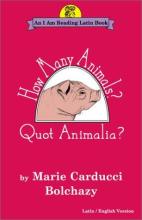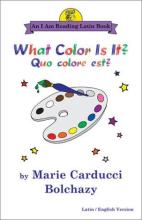Latin Supplement
Conversational Latin for Oral Proficiency
The chapters are designed so that they need not be done in a particular order so that readers can jump to a topic of particular interest and gain some depth in their Latin studies by practicing pronunciation, memorizing conversational phrases, creating Latin-language skits or just "messing around" with the language a bit. The book includes plenty of ancient terms as well as words for modern ideas and inventions, so you won't have any trouble discussing everything from weather to the Internet during Latin class.
There are some really neat extras as well. The "Days, Weeks, Months and Years" segment gives some fascinating details on the calendar and time-telling used by the Romans. The "Grammar" chapter, which is particularly extensive, gives plenty of content for teachers wishing to conduct their entire Latin classes in Latin. There are also conversational pieces which would be great for memory work (with a question and answer format), for example: "What is a verb?" and "Give examples of a relative pronoun." (This segment, even if studied only in English, makes excellent review work as well.)
The topics covered are as follows: "Greetings:, "Family", "House and Furniture", "Daily Activities", "Sports and Other Leisure Activities", "The Human Body" (like a normal dictionary, proper names for body parts are included) , "Health and Physical Fitness", "Food and Drink", "Days, Weeks, Months, Years", "Expressions of Time", "Useful Colloquial Expressions", "Clothing and Jewelry", "School", "Buying and Selling", "The Weather", "Animals", "Emotions and Qualities", "Trades and Professions", "The City and Public Buildings", "Government", "War and Peace", "Law and Criminal Justice", "Geography and Topography", "Transportation" and "Grammar". Appendices include "Yes and No in Latin", "Colors", "Numbers", "Proverbs and Sayings", "Computer Terms" and a 137 page General Vocabulary arranged English to Latin.
Dictionary of Ecclesiastical Latin
All Latin students will benefit from ready access to a Latin dictionary, but Catholic Latin students using a Catholic textbook, or reading from Church documents and the Vulgate Bible in their original Latin, will especially benefit from access to a Catholic Latin dictionary. The Dictionary of Ecclesiastical Latin has been written to help both seminary students and laypeople as they advance beyond their introductory Latin studies. The hardback binding, clear typeface, and non-shiny paper combine to make this book a pleasure to use. The more than 17,000 entries have been drawn from Sacred Scripture, the Codes of Canon Law of both 1918 and 1983, the liturgy, the documents of Vatican II, and the 1990 Code of Canons of the Eastern Churches. By providing the most common English definitions of Latin words and phrases as they are used by the Church, this wonderful reference book will be turned to again and again.
Easy Latin Crossword Puzzles
This will make a fun supplement to students in upper grade school or high school who have already studied Latin for a year or two. The words are fairly simple (requiring both English to Latin and Latin to English translations). One feature that makes it quite accessible is a list of words from which to choose the correct word. There are 50 crosswords in all, plus a complete answer key, and a brief introduction to Roman numerals, some common Latin abbreviations in use today and a list of the Latin mottoes of 19 states and the District of Columbia. A nice product at a very reasonable price!
Latin for Beginners (Passport's Language Guides)
In the typical Usborne style, this book offers lots and lots of cartoon-like pictures with Latin dialogue and descriptions and quite a bit of grammar and other tidbits along the way. The pictures are a little goofy (I think they use the same pictures for all the different languages they have out in this series), but the book is packed with content (particularly for the price). This might make an especially nice supplement for grade school students studying Latina Christiana or another early Latin text. Students at this age level will often enjoy writing little notes or dialogues in Latin and this would make a good source of additional vocabulary. It's also fun to have around the house to absorb a little Latin as a family.
Latin Proverbs
Latine Cantemus
This is a fun collection of popular and traditional songs translated in Latin. It's a nice exercise for Latin class to practice pronunciation and gain a little cultural literacy to do some of this kind of singing in class. You'll a wide variety of songs, including: Old MacDonald Had a Farm, Happy Birthday, Amazing Grace, My Bonnie, The Star Spangled Banner, Good Night Ladies, Lots of Christmas Carols and a section of Gregorian Chant. With the exception of the 20 page Gregorian Chant segment (which includes the traditional Chant notation), only words are included and no musical notations. The book includes nearly 100 songs (although a few are repeated with different translations). The only downside, in my opinion, is that price is a little steep for such a slim volume - particularly if you want to get a number of copies for group singing. You might want to keep an eye out on the publisher's website for specials. (At the time of this writing, this title was marked down 20% to $13).
Lingua Angelica
There are several components of this Latin/Music Appreciation Program. Materials may be purchased individually or in sets, depending on where you purchase them from.
Song Book and Audio CD: A lovely, six voice polyphonic choir performs twenty-four Latin songs and hymns a capella (without accompaniment) on this professionally-recorded CD. Not only is this a beautiful way to present this type of music, but it also makes the music easier to learn for children and families. These songs represent some of the most beautiful musical treasures of the Church - from Gregorian Chant ( e.g. Mass of the Angels and Adoro Te ) to classic four-part hymns (e.g. Panis Angelicus and Stabat Mater). Singing can be a great component of your Latin curriculum. It aids pronunciation, provides additional (and fun) practice and helps students make connections to Latin used outside of class.
The CD alone is a wonderful complement to a Catholic education and a simple way to introduce your children to the beauty of our Catholic heritage. I found my two year old singing snatches of the Ave Maria when we had only listened to the CD a few times. The song book includes four part harmonies and extensive verses all written in modern musical notation (if you'd like the Gregorian Chant notation for the appropriate songs, you will find those in the Adoremus Hymnal). In addition to the more "serious" selections, this set also includes some fun-to-sing songs like the traditional German Student Song Gaudeamus Igitur.
Even on their own, the Lingua Angelica CD and Song Book will make an excellent addition your Latin curriculum, a beautiful component of family devotions and an excellent resource for music history and appreciation. The song book also includes historical notes on the songs and offers some related topics for further research. Every Catholic family - even those not yet studying Latin formally - will enjoy and benefit from this musical set.
Student Book and Teacher Manual (Level I): The first level Lingua Angelica text gently guides student and teacher through sixteen Latin prayers and songs through the study of vocabulary and grammar. While this is not intended as a complete Latin program in and of itself, it will reinforce grammar components learned elsewhere and help interconnect Latin studies with related subjects. Ideally, this supplement would be started once the student has completed about three quarters of Latina Christiana I. Each lesson covers a song or a part of a song; offering new vocabulary and practicing noun, verb and adjective endings. The back of the text includes thirteen pages of Grammar Charts for easy reference.
The Introduction to the Teacher's Manual gives a great overview of the reasons why Christian Latin can be so helpful and formational on many levels - both as a foundation of "real" Latin for students to build their later studies upon and as a beautiful and worthy subject matter for our children to memorize and learn to appreciate for their own sake. This manual also includes a detailed schedule (with varying levels of learning activities which are easily adaptable for different abilities) and grammar and vocabulary notes on each song.
The entire Lingua Angelica - the Song Book, audio CD and two levels of Texts (with teacher's manuals) provides a well-planned six-year Latin supplement based on these songs and prayers. These six years are specifically intended to complement the two years of Latina Christiana and four years of Henle.
How Many Animals?/Quot Animalia?
What a great idea - simple Latin readers to introduce young children to the language. Big pictures are paired with large, clear print, just like an English easy-reader. This first book in the series is a simple picture book with very nicely drawn, realistic pen and ink illustrations. The format allows readers to intuitively figure out what some basic words mean by connecting them with the pictures. The text introduces 13 types of animals, offering each Latin word in the singular and plural. The reader is also exposed to the Roman numerals from I-XII, and C as well as the Latin names for the same numbers. Just the last few pages introduce a few more words, including some relevant adjectives. The book wraps up with a complete translation, glossary and notes in the back.
This is a really nice beginning book for young children - particularly those whose older siblings are studying the language. Highly recommended!
Donated for review by Bolchazy-Carducci
What Color Is It?/Quo colore est?
This title offers charming, child-friendly pen-and-ink illustrations to introduce the colors (in Latin) to young children. The text is quite a bit more complex than How Many Animals? Quot Animalia?, but would provide a good opportunity for young Latin scholars to practice their pronunciation by reading the book aloud to a younger sibling. Since the topic is "colors", I think this book will be best enjoyed if an artist in the family colors in the illustrations first. Translations and glossary are in the back.
Donated for review by Bolchazy-Carducci

